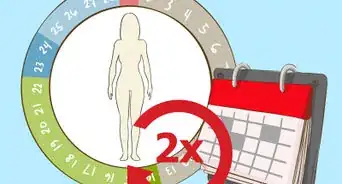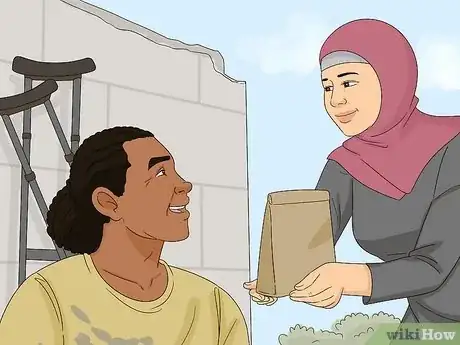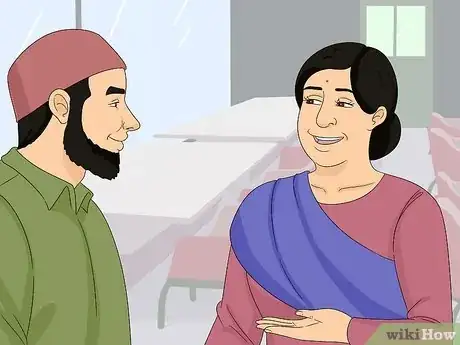This article was co-authored by wikiHow staff writer, Nihal Shetty. Nihal Shetty is a Writer and Editing Fellow at wikiHow who splits his time between Michigan and Mexico City. Before his role at wikiHow, he was an instructor of Russian literature at the University of California, Berkeley. Nihal received a BA in Comparative Literature from Columbia University and an MA in Russian at Berkeley.
There are 8 references cited in this article, which can be found at the bottom of the page.
This article has been viewed 23,465 times.
Learn more...
In 2022, Ramadan, the holy month of Islam, takes place from April 2nd to May 2nd. Muslims believe that it was during this time that the Prophet Muhammad received his first revelations from God.[1] X Research source For Muslims, Ramadan is a time to grow spiritually and to further build their ties with the rest of the Muslim community. If you're wondering how to wish a Muslim friend or colleague a happy Ramadan, we’ve got you covered! Keep reading for our comprehensive guide, where we’ll go over must-know greetings in both Arabic and English.
Steps
“Ramadan Mubarak” (ram-AH-dan mu-BA-rack)
-
"Ramadan Mubarak" translates to “Have a blessed/happy Ramadan.” It’s the traditional way of wishing someone a happy Ramadan, and using it can show your interest in Muslim culture. Although you may hear different expressions in other countries, this is a great way of wishing a Muslim friend in an English-speaking country a happy Ramadan.[2] X Research source
- In response to “Ramadan Mubarak,” you can say “Khair Mubarak,” or “You as well.”
“Ramadan Kareem” (ram-AH-dan kah-REEM)
-
“Ramadan Kareem” means “Have a generous Ramadan.” This phrase often gets used as an alternative for “Ramadan Mubarak.” It expresses your wish for your friend’s Ramadan to be filled with opportunities for reflection, growth, and family time.[3] X Research source
- An appropriate response to “Ramadan Kareem” is “Allahu Akram” (al-AH-hoo ak-RAM), which means “God is much more generous.”
- For many Muslims, the generosity of Ramadan is reflected in fasting. Muslims practice self-control in order to bring themselves closer to spiritual riches.
- During Ramadan, many Muslims donate food and money. This reflects another sense in which this month is one of generosity.
“Eid Mubarak” (eed mu-BA-rak)
-
Many Muslims use “Eid Mubarak” on the last day of Ramadan. This expression literally translates to “Have a blessed Eid al-Fitr.” Often simply known as Eid, Eid al-Fitr is the holiday that signifies the end of Ramadan. During this holiday, Muslims thank Allah for giving them the strength to fast and for bringing the Muslim community together.[4] X Research source
- In 2022, Eid al-Fitr takes place on Tuesday, May 3, 2022. The date of Eid changes every year, since it is based on the lunar calendar.
- If someone wishes you Eid Mubarak, it's customary to reply “Khair Mubarak,” or, “You as well.”
- A less common alternative for “Eid Mubarak” is “Eid Kareem” (eed kah-REEM), or “Have a generous Eid.”
- Eid al-Fitr translates to “The Festival of the Breaking of the Fast,” and is among the holiest of all days in Islam.
“May this Ramadan be as bright as ever.”
-
A popular, short English wish can be very effective. With the growth of social media, there are plenty of popular wishes that Muslims in the English-speaking world often use to wish one another a restful and meaningful month. Say or write something like:[5] X Research source
- “Four weeks of blessings to you this Ramadan.”
- “Wishing you all the blessings of this holy month.”
- “May Allah bring you peace and happiness this Ramadan.”
- “Let the spirit of Ramadan remain in your heart and light up your soul from within.”
“May Ramadan fill you with peace, harmony, and joy.”
-
A longer wish can really demonstrate your goodwill. It’s pretty common for Muslims to exchange longer or more poetic greetings and wishes during Ramadan. Joining in on this tradition—even if just over a text message—can be a nice gesture. Say something like:[6] X Research source
- “May the blessings of the month of Ramadan be on all of us, and may Allah grant our prayers and fasts. Happy Ramadan to everyone.”
- “I hope that Allah answers all your prayers in this holy month of Ramadan. Wishing you and your family Ramadan Mubarak.”
- “May this holy month bring an abundance of blessings and closer to enlightenment. Ramadan Mubarak to you and your family.”
- “I hope that the holy spirit of Ramadan enlightens our souls and guides us to our deen. Ramadan Mubarak.”
“Have a happy Ramadan.”
-
Muslims accept all good wishes, and a simple wish is perfect. If you feel more comfortable expressing your best wishes for Ramadan in a more conventionally English way, this is totally acceptable. In France, for instance, you’ll often hear people say “Bon Ramadan,” or “good Ramadan.” Try saying something like:[7] X Research source
- “Enjoy Ramadan.”
- “Wishing you all the best for Ramadan.”
- “Sending you my love this Ramadan.”
- “May you and your family have a wonderful Ramadan.”
Ask questions to learn more about Ramadan.
-
Being open to learning can bring you closer to Muslims in your life. Ramadan is a month of goodwill and charity, and many Muslims would be very happy to share this special tradition with you. You may even get an invitation to join a Muslim for their iftar meal—an opportunity you should not pass up. Although you should ask questions if you’re curious about any aspects of Ramadan, try to keep these etiquette tips in mind:[8] X Research source
- Be respectful of your friend’s fast. They’ll appreciate an invitation to the coffee shop, but if they don’t drink anything, don’t pressure them.
- If your friend isn’t fasting, avoid asking why. Fasting is a private matter, and asking your friend a question like this can be pretty invasive.
- Stay away from talking about fasting as a way to lose weight. Remember that this is a very spiritual activity. Try not to talk about fasting as a way to get slim for the summer.
You Might Also Like







-Step-25-Version-2.webp)



 Nikah Requirements and Procedure (and What to Expect If You’re a Guest)
Nikah Requirements and Procedure (and What to Expect If You’re a Guest)


References
- ↑ https://www.ucf.edu/news/what-is-ramadan/
- ↑ https://www.aljazeera.com/news/2022/4/1/infographic-ramadan-greetings-in-16-different-languages-interactive
- ↑ https://www.arabamerica.com/ramadan-2020-greetings-how-to-say-happy-ramadan-in-arabic/
- ↑ https://www.countryliving.com/life/inspirational-stories/a39166272/when-is-eid-al-fitr/
- ↑ https://www.arabamerica.com/ramadan-2020-greetings-how-to-say-happy-ramadan-in-arabic/
- ↑ https://www.hindustantimes.com/lifestyle/festivals/ramadan-mubarak-2022-best-wishes-images-messages-and-greetings-to-share-with-loved-ones-101648774356304.html
- ↑ https://www.newsweek.com/ramadan-mubarak-kareem-greetings-phrases-explained-1583154
- ↑ https://fridaymagazine.ae/life-culture/self-improvement/ramadan-etiquette-to-keep-in-mind-1.2227849
About This Article




















































